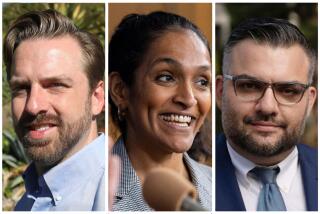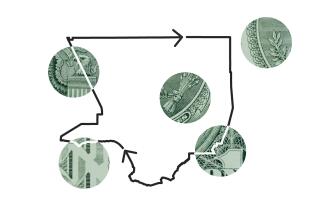Money for L.A. council District 4 candidates not all homegrown
More than a dozen candidates are stumping for votes in L.A.’s sprawling City Council District 4, an area that spans Sherman Oaks, the Hollywood Hills and Miracle Mile.
But as they drum up campaign cash, their dollars don’t necessarily come from those neighborhoods.
A Los Angeles Times analysis finds that some District 4 candidates are getting most of their money from outside the district, whereas others have largely funded their campaigns locally — a distinction some candidates have seized on as evidence of their connection to the unwieldy district. Some political watchers argue that getting lots of money locally is a sign of campaign strength.
MORE: L.A. City Council District 4 race
“It’s a data point that you can’t ignore,” said Michael Trujillo, a consultant who is not working on any of the District 4 campaigns.
Trujillo said that kind of local backing was part of what helped City Councilman Joe Buscaino, a political newcomer when he captured his seat three years ago. “If you raise $250,000 and the massive majority of that money is from within the district, that’s the campaign that you should keep an eye on,” Trujillo said.
But others are dubious that local cash is anything more than a talking point as candidates gear up for the March 3 primary. “No one’s ever lost an election for being a carpetbagger,” said Dermot Givens, another campaign consultant who isn’t involved in the race. “It’s a great talking point — but it doesn’t affect how people vote.”
The Times analyzed campaign contributions thus far in the race to determine what percentage of dollars came from ZIP Codes that are in or at least partially overlap District 4. The Times analysis did not examine contributions of $99 or less, for which candidates are not required to list donor names and locations. Such contributions made up less than 3% of campaign money in the race so far.
INFOGRAPHIC: Tracking the money in L.A. City Council races
Candidates Sheila Irani, Tomas O’Grady and Carolyn Ramsay drew the highest share of their campaign dollars from ZIP Codes at least partially in the district. At the top of the list was Irani, a businesswoman who used to work for termed-out incumbent Councilman Tom LaBonge. Local money made up 82% of her listed contributions.
“I really am not a candidate who has leaned on outside money,” said Irani, who recently raised the issue at a forum.
O’Grady, a nonprofit director, had gotten 75%of his campaign money from donors in or near the district, which he heralded as a sign of “tons of community support.” Former LaBonge chief of staff Ramsay had garnered 72% of her money locally and raised the highest dollar amount from in or near the district — $184,000 as of the middle of January.
“The folks who are supporting me are in communities I’ve been working in for 15 years,” Ramsay said in an email.
Other candidates got a much smaller share of their money from the district, including some who have led the pack in fundraising. Steve Veres, an aide to state Sen. Kevin de León, is among the top fundraisers in the race but reaped only 22% of his campaign money from the area, based on the analysis of listed contributions.
His press secretary, Brian VanRiper, pointed out that Veres had gotten backing from citywide groups that extend beyond District 4, such as the county Democratic Party.He said that although a smaller share of their dollars came from the district, roughly a third of their total donors were located there. And he argued that a candidate such as Ramsay was more likely to get local donations because of her ties to LaBonge.
“People are a little afraid to go against the council office, and that’s helping out someone like Carolyn an awful lot,” VanRiper said.
David Ryu, the leading fundraiser in the race, got only 34% of his money from ZIP codes that overlap with District 4. In reaction to The Times analysis, Ryu said that more than half of his donors had given less than $100 — and therefore were left out of the analysis. However, those donations of $99 or less made up only 2.3% of his overall campaign cash, The Times found.
Meet the candidates for L.A. City Council, District 4
Both Ryu and Veres “have significant bases elsewhere,” said Steve Afriat, president of Afriat Consulting Group, which is not working with any of the candidates. Afriat said Veres, for example, can draw on donors tied to the community college district where he is a trustee.
Ryu, in turn, appears to be attracting donations from Asian Americans across L.A. who are excited about his candidacy, said Kathay Feng, executive director of California Common Cause.
“There is a pent-up desire for some Asian American representation on the council — and many people are donating to the Asian American candidate as a way of expressing that desire,” she said.
The candidate with the lowest percentage of local campaign money — 16% — was businesswoman Tara Bannister. She had raised nearly $59,000 total as of the middle of January.
The District 4campaign isn’t unusual in attracting outside money: In the 2013 primary election, council candidates got only 16% of their donations from their districts, according to an Ethics Commission analysis. Candidates in wealthier districts tended to get more of their money from donors within the district.
Getting lots of local money is “something to crow about,” said Jaime Regalado, emeritus professor of political science at Cal State Los Angeles. “If you’re raising a lot of dollars and the vast majority of those dollars are within the district, it makes you seem like a homegrown product.”
Still, Regalado added, “those who have the most money usually have a tremendous advantage, no matter where the money is from.”
As ofFriday, only two District 4 candidates had qualified to get matching funds from the city: Ramsay and attorney Teddy Davis. To get matching funds, candidates must receive at least 200 contributions of at least $5 from people residing in the district, among other requirements. The Ethics Commission is still determining whether several other candidates qualify for the funds.
Follow @LATimesEmily for breaking news from Los Angeles City Hall
Times staff writer Anthony Pesce contributed to this report.
More to Read
Start your day right
Sign up for Essential California for news, features and recommendations from the L.A. Times and beyond in your inbox six days a week.
You may occasionally receive promotional content from the Los Angeles Times.







